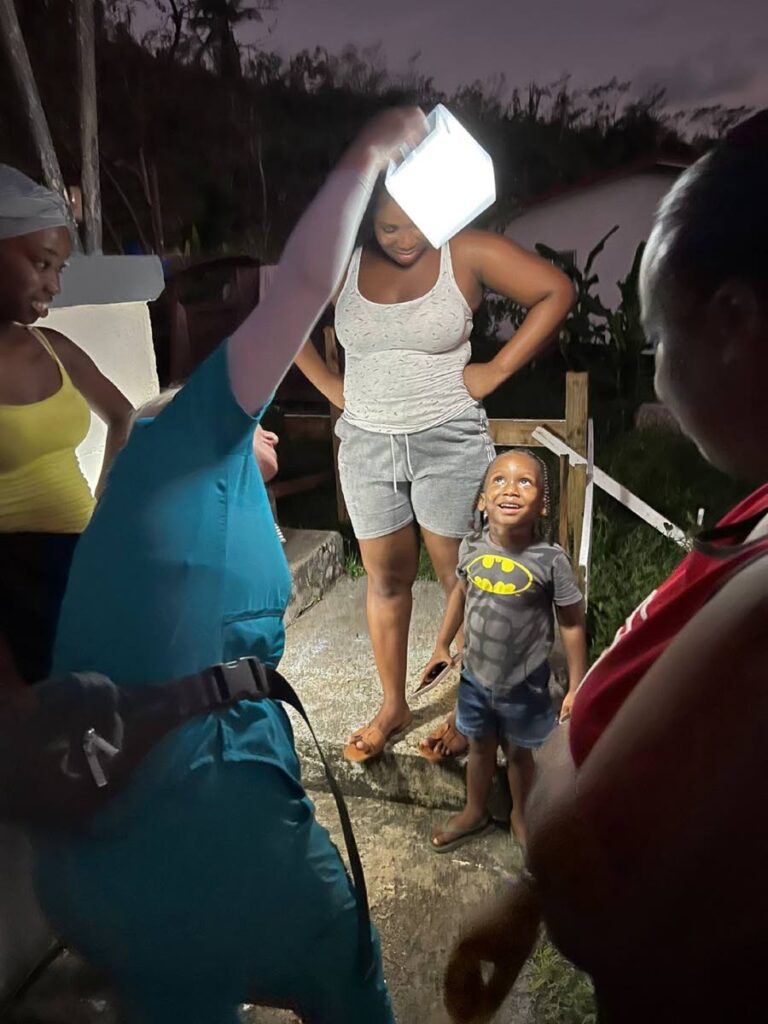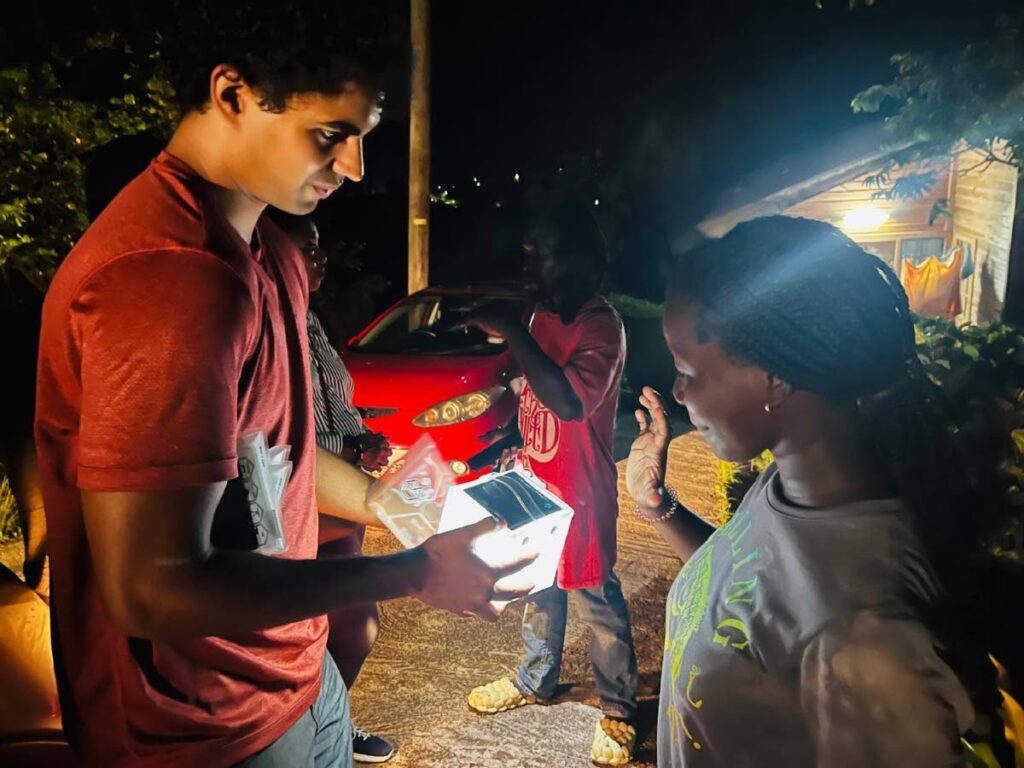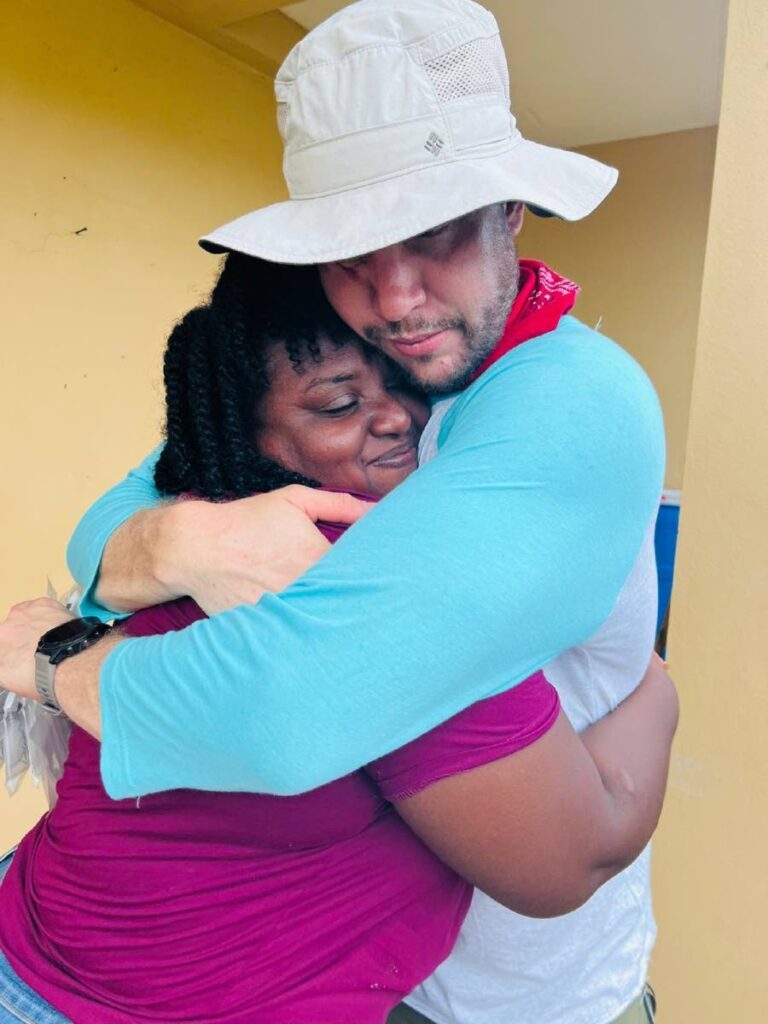Carriacou residents still in shock 3 weeks after hurricane

Shock and despair are the prevailing emotions among residents of Carriacou as they struggle to recover from the devastating effects of Hurricane Beryl. The hurricane hit the island on July 1, a little over three weeks ago.
Development economist and former Newsday columnist Kiran Mathur Mohammed is currently volunteering in Grenada with the Australian volunteer organisation Third Wave Volunteers, as well as other organisations, to assist in relief efforts.
Mohammed said he had done relief work in Afghanistan, Venezuela and Ukraine, but this was his first disaster mission in the Caribbean.
“In Trinidad and Tobago and the Caribbean, we’re surrounded by this heavy energy. There’s a lot of complaints, everyone is mad in traffic, etc but being here, being with people who have been totally wiped out and lost everything, feeling and touching them, and feeling compassion from their hearts, that has been a blessing for me.
“There’s a real sense of community. We would be giving out lights and they would say, ‘No, give it to my neighbour.’ They wanted to make sure their neighbour had one rather than them having two. It brought out the best of how we are as Caribbean people. Any sort of division goes away. So many people just want to be held. It totally shifts your perspective completely where you just want to give love and be of service. As a Trini, it profoundly hit me that all these people are my people as well.”
Speaking to Newsday via Google Meet on July 18, Rotary Club of Grenada president Colin Francis said the mood on the ground was one of shock and despair.
“People don’t know where to begin. They sit every day, and if you’ve ever been in a situation where you didn’t know where to begin, you see all the things that need to be done, but you just don’t know where to start. Carriacou has a high number of single mothers who need to begin somewhere and they need help. Just imagine the normal struggle they have and now it’s compounded by several digits.
“We have to prepare to address mental health and wellness, if not immediately, in the immediate future, making sure there are ways people could have on-the-ground access to people trained to deal with mental health, whether through a toll-free number, and maybe that’s where other islands could provide assistance.”
Francis said the island had been devastated by the hurricane, with over 95 per cent of homes and facilities being destroyed.
“Most people are living with families in basements with this point because the top floor or roof is gone. That can be seen as a health risk as you have 10-15 people living in a very confined space.
“Other people are living in overcrowded shelters. Others just choose to remain home with tarpaulins over the roofs, and you can imagine the conditions with no electricity, no running water, mosquitoes, it’s just a recipe for other disasters.”
Francis said there’s a need for more tarpaulins, generators, solar lights, tin roofing, lumber and other construction supplies. He said it would take some time for the electricity to return as telephone and power lines were down and intertwined at the time.
“Carriacou is a difficult place to get to in terms of access and cargo in, so that’s another layer of challenge. We need things to help them exist on a daily basis. The generators are needed not only for daily power but to power the tools. We need roofing supplies and other things to alleviate the daily pressures they’re experiencing right now.”
He said the Rotary Club had collaborated with partners to get supplies such as food, water filters, solar lighting, water, things to help with sanitation, medical care supplies.
“We’re targeting speed and getting it to people who need it the most.”
Francis said discussions were happening about assisting with the rebuild phase, possibly through getting funding to purchase material on the island to assist with economic recovery.
He said co-ordination was happening with other Rotary Clubs in the District under the coordination of district governor Debbie Roopchand.
“It’s our responsibility as NGO’s to give them hope and, through our efforts, strength. They need that right now.”

Volunteer: Relief, support desperately needed
Third Wave Volunteers founder Dr Alison Thompson said the islands of Carriacou and Petit Martinique were still in the stage where relief was desperately needed. She said while aid was starting to arrive, it still needed to get to the people.
“We’ve been going door-to-door and there’s 15-20 people in one house, no electricity, little food, little access to clean water. Diseases will be coming over the next few weeks and months. Covid19 has broken out on Petit Martinique and that’s going to spread because people are evacuating. It keeps raining and people have open buckets of water, and that’s where mosquito-borne diseases start.
“Then there’s leptospirosis from the rats, because when the cases of water come in they’re stacked up and the rats run over them. So you open a bottle of water and think it’s safe but it’s on the outside.”
Thompson said another issue was that of price gouging, which she had encountered in every disaster area. She said prices would triple for building materials.
She called for prices for travelling between islands to be reduced for locals as it was currently US$31 one-way. She said there was no way to get cash to the island, which was needed to build the economy and keep businesses going. She said normally it could be sent through Western Union or to a resident, but this wasn’t possible in this case.
She said the group had been giving out solar lights, as based on her experience in Haiti, light was key to preventing rapes and domestic violence.
“Women would say light is safety because the rapists would go to the next dark house. Even though the solar lights are small, they light up the home. We’ve also been focusing on water filtration.”
Thompson said she was most concerned about the single mothers.
“When we see you, we hug you, and we don’t let go. These women just sink into our arms and start bawling. It’s the first time since the disaster they’ve had time to release because they’ve had to be so strong for their children.
“Generally, there’s this deep despair, more than I’ve felt in other disasters. These homes have been in their families for generations. Nobody has insurance. There’s no jobs or anything, everything’s gone. How do you come back from that?”
She said people were living in tents and dealing with heat and mosquitoes. She suggested bringing in a ship so people could have somewhere to stay. She said mobile clinics were needed to go into the mountains to get to the people, as most vehicles on the island had been destroyed.
Thompson emphasised the need to deal with mental health.
“They’re in the stages of grieving right now in the sense that every disaster they go through shock, it’s kumbaya, everyone’s coming together, but then you go into the other grieving stages, so anger will come and they’ll be like ‘What am I going to do, because I have nothing.’ But they’re still in shock.”
She said she hoped no other hurricanes hit the island, as Beryl had formed so early in the season. She urged people to support the grass-roots organisations and people doing the work on the ground, including volunteers and church groups.

Hurricane survivors need time to grieve
Volunteer Nicholas Quay said people were dealing not only with the loss of property, but also loved ones and neighbours.
“We met a woman whose sister had died from hurricane injuries. Livestock had been killed by flying housing materials. People had been injured that died in the last week. We’re dealing with mothers taking care of their nieces and nephews because their sister passed away. They’re not only in a state of shock but a state of loss.
“I was able to help the mothers know it was a safe space, and I’d hug them if it was appropriate. I’d tell them they were OK and the scariest part of the storm had passed. But it’s not over. They’re dealing with shock, health issues, environmental issues, rats, mosquitoes, sickness, etc, and it’s letting them know it’s OK to be scared now, because they weren’t able to be scared through the storm, they had to be strong for their kids. It’s important to give them a space to feel the fear now.”
He described how one woman put her nine-year-old daughter under the kitchen sink among the pipes as it was the safest place in the house, while another had put her daughter in the cupboard and sat in front of it so the doors wouldn’t fly open. He said another woman had 16-17 people living in her house as it was the only one that hadn’t been destroyed in that particular area.
“Giving them that ability to grieve is so important right now, because these women are tired, they’re exhausted. They’re serving the community, they’re focusing their energy all day long, 12-18 hours a day caring for every one around them. There are elderly who can’t leave their house and these women have to walk long distances to get food for them. Women have to worry about safety and security for their kids and themselves. Allowing them to melt into the trauma around them will help them stay strong.”
Grenadian resident Serena St Paul said health care was extremely important.
“Many people had hypertension and strokes and didn’t know about it. People need to be examined medically and given the medication. They also need to be given tips on how to keep healthy, now that their area has been destroyed. You have things like dengue coming up, gastroenteritis from dirty water and other diseases.”
To help buy solar lights, go to: https://angelinkweb.page.link/UhPvKDiGQRbg9F5Y9

Comments
"Carriacou residents still in shock 3 weeks after hurricane"